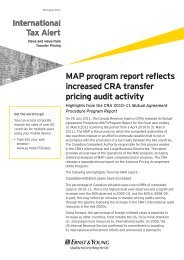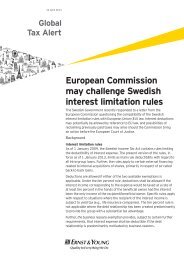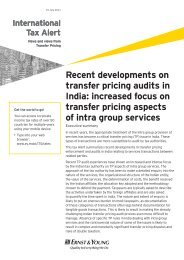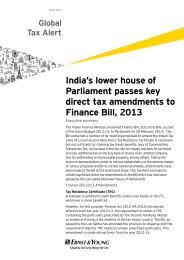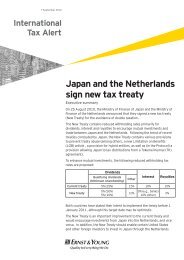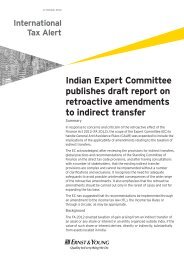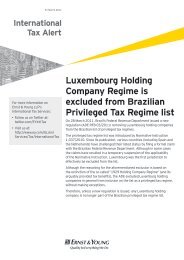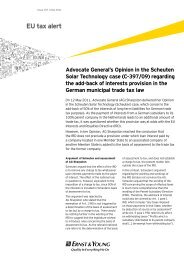Download - Ernst & Young T Magazine
Download - Ernst & Young T Magazine
Download - Ernst & Young T Magazine
You also want an ePaper? Increase the reach of your titles
YUMPU automatically turns print PDFs into web optimized ePapers that Google loves.
The importance of family integration<br />
The adjustment for the expatriate may be<br />
difficult enough, but many believe that<br />
assignments more often than not fail because<br />
the worker’s partner and children don’t<br />
acclimatize well to their new surroundings.<br />
“Family issues are the biggest obstacle to<br />
expatriate success,” says Yvonne McNulty, an<br />
academic specialising in global mobility at<br />
Monash University in Australia. “If the<br />
organization is focusing only on the expat and<br />
not on the family, problems can quickly surface.”<br />
When you look at the available evidence, it’s<br />
not hard to understand why. According to an<br />
extensive 2008 survey by the Permits<br />
Foundation, interviewing more than 3,000<br />
expatriate spouses and partners of 122<br />
nationalities, 89% of spouses were working prior<br />
to the assignment, but only 35% during the<br />
assignment itself.<br />
Three-quarters of those not working said they<br />
wanted to work, inevitably leading to frustration,<br />
disillusionment and boredom. Eight in 10<br />
working spouses reported a positive adjustment<br />
to their adopted country, compared with only<br />
32% of non-working spouses. “The location may<br />
have changed, but the expat worker’s routine of<br />
getting up and going to work hasn’t,” says<br />
Shipley. “But the partner doesn’t know a soul –<br />
he or she’s not working and, unlike the expat,<br />
has no ready-made networks to tap into. Three<br />
or four months down the line, you’re both fed up,<br />
and we’re talking about bringing you home.”<br />
Many companies, including BT, try to help<br />
partners (also known as, “the trailing spouse”),<br />
by offering them a few thousand pounds to be<br />
used for anything that might help them to<br />
integrate, be it a vocational training course,<br />
language classes or club membership.<br />
However, McNulty says that the amount of<br />
corporate attention devoted to helping the<br />
spouse and other family members is simply<br />
insufficient, given the impact of their potential<br />
unhappiness on the success of the overall<br />
assignment. “HR departments have a hugely<br />
difficult time getting sufficient funding for<br />
something that doesn’t have a clearly<br />
Insufficient corporate attention is<br />
devoted to helping the expatriate's<br />
family members<br />
measurable return on investment,” she says.<br />
“Family support has rarely been seen as an<br />
essential part of expatriate management. Maybe<br />
companies shy away from it because the issue is<br />
too challenging, or perhaps they are wary of<br />
crossing a line and interfering in their employees’<br />
personal lives.”<br />
Further statistics from the Permits Foundation<br />
appear to verify these views. About threequarters<br />
(76%) of expat partners, for example,<br />
would have welcomed some guidance or advice<br />
on their job search, but only 11% believed they<br />
received adequate support in this regard.<br />
Taking matters into their own hands,<br />
expatriates and their partners have established<br />
informal networks throughout the world,<br />
including clubs to meet each other face-to-face<br />
and websites for sharing ideas, anxieties and<br />
local recommendations. Most partners’ websites<br />
and blogs are set up by women (according to a<br />
2010 survey by Brookfield Global Relocation<br />
Services, 83% of expatriates are men), but there<br />
are signs that support groups for male partners<br />
are emerging, such as the Brussels-based STUDS<br />
(Spouses Trailing Under Duress Successfully).<br />
Careful consideration<br />
Thomas Efkemann of <strong>Ernst</strong> & <strong>Young</strong><br />
recommends that expatriates should discuss the<br />
potential international assignment in depth with<br />
their partner and family prior to accepting the<br />
offer. “Company managers should allow them<br />
the time to consider all the implications,” he<br />
says. “Sometimes, after the initial wave of<br />
Companies need to intervene to<br />
ensure that executives are not<br />
placed at a financial disadvantage<br />
enthusiasm for this exciting opportunity to work<br />
abroad, problems begin to arise. Where will they<br />
live? What about schooling and health care? Is<br />
the partner able to work abroad as well? By the<br />
time worker and partner both realize they don't<br />
really want to go, they may have already made a<br />
commitment.”<br />
A “look-and-see” trip to the relevant<br />
destination, often paid for by the company, can<br />
give the family the knowledge they need to make<br />
an informed decision, prior to formal acceptance.<br />
If they then do decide to take the plunge, a good<br />
destination service provider who can assist with<br />
the practicalities of the move is also invaluable.<br />
“Having someone there to help you find the right<br />
property to live in, sort out your bank account, get<br />
you a driving license or show you the local grocery<br />
store, can greatly ease the stress involved in the<br />
transition to a new country,” says Shipley.<br />
“Cutting back on this service is a false economy<br />
for companies. They need their expatriates to hit<br />
the ground running, not spend their days<br />
worrying about how to pay an electricity bill.”<br />
For any potential expatriate family, an open<br />
and curious mind, and the motivation to make the<br />
assignment work, along with the initial assistance<br />
an employer might provide, will make for a good<br />
start to what can be a fulfilling and successful<br />
venture. But those who are inflexible by nature,<br />
or are accompanied by a family member dragged<br />
to the foreign destination against their will, are<br />
unlikely to get successfully through the long days,<br />
weeks and years that lie ahead, even with the<br />
most expert tax advice or instructive cultural<br />
training course in the world.<br />
Most common issues<br />
affecting international<br />
assignments<br />
49%<br />
Family- or spouse-related issues<br />
47%<br />
Compensation package<br />
36%<br />
Repatriation<br />
32%<br />
Location or cultural issues<br />
14%<br />
Others<br />
9%<br />
Position-related issues<br />
(e.g., unsatisfactory position)<br />
*multiple responses possible<br />
Source: <strong>Ernst</strong> & <strong>Young</strong>'s Global<br />
Mobility Effectiveness Survey 2011<br />
<strong>Ernst</strong> & <strong>Young</strong> Issue 07 T <strong>Magazine</strong> 33






